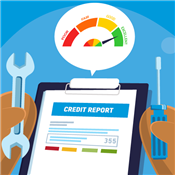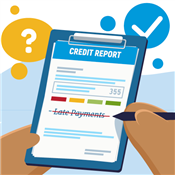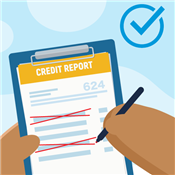How to Remove Bankruptcy From Your Credit Report
Bankruptcies can tarnish your credit reports for up to 10 years. But these steps could help you remove these derogatory items from your credit reports.
 |
Bankruptcy can be cleared from your credit reports by:
Times are tough, and you've decided to file for bankruptcy.
But there's a catch: Your bankruptcy becomes a public record. Worse, it can stay in your credit reports for 7 to 10 years.
In this guide, learn how to remove a bankruptcy and what else you can do after you've filed for one.
What is bankruptcy?
Bankruptcy is a form of debt relief for people struggling to repay debts. It's a legal process that can eliminate debts and give you a fresh start.
Additionally, bankruptcy allows you to restructure your finances to pay back debts over time.
The most common types of bankruptcies for individuals are Chapter 7 and Chapter 13.
Chapter 7 is referred to as a liquidation bankruptcy. When you sign up for Chapter 7, trustees liquidate qualified assets and use them to repay your creditors.[1]
Chapter 13 is a repayment plan that lasts 3 to 5 years. You will create the plan and propose it to the court. If the bankruptcy court approves, an appointed trustee supervises your repayment plan and distributes the payment to your creditors.[2]
How to Remove Bankruptcy from a Credit Report
Bankruptcies can stay on your credit report the longest and affect your credit significantly. Here are two ways you can remove bankruptcy from your credit report.
Dispute Inaccurate Bankruptcies
Inaccurate bankruptcy records can be removed by the credit bureaus. This includes records that are past the 7 to 10-year mark or records that aren't yours in the first place.[3]
Here's how you can challenge the credit bureaus for removal:
- Get your free credit reports from AnnualCreditReport.com.
- Review for errors and mistakes.
- Write a dispute letter to the credit bureaus.
- Wait 30 days for the credit bureaus to investigate your dispute.
The credit bureaus will take out a bankruptcy record from your credit reports if they can't verify its accuracy. However, such cases may be rare since you are the one filing the bankruptcy petition. It's not your creditor or lender reporting an entry to the credit bureaus.
Once the inaccurate bankruptcy is removed from your credit report, creditors must stop reporting it as well. If creditors continue to report discharged items, you can dispute these creditors with the help of credit repair companies.
Wait For The Bankruptcy To Disappear
The next best thing to do is play the waiting game until your bankruptcy falls off.
The record will impact your credit most in its early days. And though it will remain in your reports for years, the impact on your credit score will be less. Plus, this will be buried by more entries and records in your credit reports over time.
How long does bankruptcy stay?
A bankruptcy record can stay on your credit report for:
- 7 years for a Chapter 13
bankruptcy
- 10 years for a Chapter 7
bankruptcy
Bankruptcy records are accessible to the public because they go through the court. This means that potential lenders and creditors can view and verify it upon request.
Chapter 7 can deduct up to 240 points from your credit score. However, the exact impact depends on your credit history and score at the time of filing.
How does bankruptcy affect you?
Filing for bankruptcy has consequences, including:
- Potential loss of assets in a Chapter 7 bankruptcy
Your non-essential assets could be liquidated if the court orders their sale to repay debts. - Decrease in credit score
Your credit score drops more than a hundred points because of a bankruptcy record. - Difficulty in getting new credit
You may have difficulty applying for new credit because banks and credit card issuers review your credit reports. - Lenders may not approve new loans
If lenders see that you applied for bankruptcy, it leaves the impression that you can't pay back debts. - Challenges at work
Employers are allowed to do credit checks (with your permission and authorization) for work-related decisions. A bankruptcy may influence an employer's decisions to hire, promote, or retain you. - Other debts remain
Not all debts are eligible for bankruptcy. So while you may get most of your debts eliminated, you may still owe some that were not dissolved by the court.
Additionally, if you file for bankruptcy and your debts are discharged, any co-signers on those loans are still responsible for repaying them in full. Bankruptcy doesn't release co-signers from their obligations.
Bankruptcy can help erase debts that you can't pay off anymore. However, take note that not all types of debts are eligible for bankruptcy, like child support, alimony, or certain unpaid tax debts.
Does removing bankruptcy increase credit score?
Yes, you can boost your credit score after removing your bankruptcy. You may see more improvements as long as you continue to build a good credit history while waiting for your bankruptcy to go away.
Credit builders can help you add more positive activity to your credit history for a monthly minimal fee. Over time, the initial effect of your bankruptcy wanes, and your credit score can increase.
How to get a 700 credit score after bankruptcy
You can get a 700 credit score after bankruptcy by maintaining these good financial habits:
- Keep your credit utilization low
Use only 10 to 30% of your total credit. This shows creditors that you utilize your credit limit wisely. - Add new credit to your profile
Apply for a credit builder loan or new credit cards that you can use to build credit. This increases your total credit and can help bring down your credit utilization and demonstrate your ability to pay on time.Don't forget to pay your loans and credit cards on time. Missing a payment adds more negative items to your credit reports. - Pay debts on time
Avoid getting late payments on your credit reports. Don't forget that payment history affects your credit score the most. - Settle balances
Owe less so you can bounce back from bankruptcy and leave behind the life of monthly dues. - Dispute inaccurate items on your credit report
Seek help from aggressive credit repair companies to eliminate inaccurate items that impact your credit reports. This way, you can focus on reducing the effects of your bankruptcy on your credit.
You can remove negative items from your credit report by yourself. Read guides to remove late payments and collection accounts from your credit report.
Bottom Line
Removing bankruptcies can be tough. Credit bureaus only remove erroneous bankruptcy records or those that are too old to be part of your credit reports.
Fret not! Bankruptcy isn't the end of the world — it's a clean slate for you. You can improve your financial habits, rebuild your credit history, and gain a better credit score over time.
References
- ^ United States Courts. Chapter 7 - Bankruptcy Basics, Retrieved 07/16/2024
- ^ United States Courts. Chapter 13 - Bankruptcy Basics, Retrieved 07/16/2024
- ^ HelpWithMyBank.gov. How long can a bankruptcy stay on my credit report?, Retrieved 07/16/2024
Write to Alex Mambaje at feedback@creditdonkey.com. Follow us on Twitter and Facebook for our latest posts.











